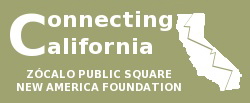
Ask Californians how to fix their state, and the answers aren’t helpful – because most voters don’t know the basics of how the state works, and their solutions are based on inaccurate information. This weekend, 300 regular Californians will participate in a different kind of poll – a Deliberative Poll – in which they receive extensive information about how the state works and have the opportunity to ask experts all sorts of questions. After learning and deliberating for three days and two nights at a hotel in Torrance, they will make informed choices about how they would address state problems. To preview this weekend’s event and to accompany Center for Deliberative Democracy Director James Fishkin’s essay about the Deliberative Poll, we asked whether such a process could point a way toward reform – or whether flaws in the structure and approach will undermine its goals.
Politicians Won’t Pay Attention
Imagine you live in California (as we do). People refer to you as “those crazy kooks from the Left Coast.” But you don’t care. You live in the Golden State, where the land and the people are beautiful and the sun always shines. Greatest state in the nation, right?

Except that things aren’t so great right now. Your economy is stagnant with crippling debt, unemployment is 12 percent, and you have one of the worst educational systems in the country. Your big move was to replace the Governator with a guy named Moonbeam.
Should anyone really take us seriously?
The answer–according to the organizers of the What’s Next California gathering this weekend in Torrance–is yes.
Three hundred randomly selected Californians will come together to discuss this state’s most weighty policy matters. They’ll be given briefing materials, they’ll interact with policy experts and each other, and then they’ll be asked what they think.

The process is called deliberative opinion polling, and the goal is to figure out what a representative sample of properly informed Californians really think.
Here’s what we think. We love the premise and the process behind What’s Next California, but we also fear this might be a missed opportunity if there isn’t enough follow-through.
We expect participants to walk away with new ideas and relationships and to feel more connected to this great state. We expect the eggheads to be surprised by the sophistication of the thinking and the outcomes. And we expect politicians to find an excuse to discount and ignore what emerges from this.
The danger is that when all is said and done, all the participants will have done is told us what they think. Ideally, they should instead become leaders in activating California, inviting their fellow citizens to create the state and the future they want to live in.

We know this is possible. In 1990, the South African government released Nelson Mandela from prison. Facing an uncertain, likely bloody transition to democracy, a cross-section of citizens was brought together over the course of a year to deliberate on potential futures. That process of thinking together and being with each other gave the participants a common vision and a set of tools and relationships for implementing that vision, contributing to a peaceful transition away from apartheid.
We’re looking forward to What’s Next California, but we hope it’s only the first step. Opinion simply fuels for a politicized process. What we need is shared vision and activation. We should be crazy enough to try this. After all, we’re Left Coasters, right?
Kristin Cobble, founder of Courion Group, is an organizational development consultant and an executive coach. Eugene Eric Kim is principal and co-founder of Blue Oxen Associates, a consultancy that helps groups collaborate more effectively.
—————————————————————————————————————
Deliberative Polling Is a Fool’s Errand
Beware of hinky pronouns.

“The public is very smart if you give it a chance,” deliberative polling guru Jim Fishkin claimed a while back, in response to doubts about his methodology. That phrasing clangs in the ear if you’re one of those strange Americans who believe the public is not an “it” at all, but a set of individuals, each of whom pursues happiness in his or her own way, with a degree of folly or wisdom you and I can’t judge.
By combining polling with top-down instruction from a panel of “experts,” deliberative pollsters hope to determine how voting would change if voters’ opinions could be forced into compliance with establishmentarian thinking – sorry, I meant to say, “if people had opportunity to become more informed and more engaged by the issues,” as Stanford’s Center for Deliberative Democracy puts it.
I believe this is a fool’s errand, and I am little comforted by promises of the nonpartisan nature of the experts. In my experience “nonpartisan” in contexts like this means “encompassing both Republicans and Democrats,” and sure enough, the list of luminaries includes such wards of the two-party duopoly as Common Cause, California Forward, the Davenport Institute for Public Engagement and Civic Leadership, and the Public Policy Institute of California. I can say that not one group on the list comes within a country mile of my own view of the proper relationship of state power to individual liberty. And as one of the nearly one-third of California voters who don’t belong to either party, I know I’m not alone.
The rational ignorance of voters is only a problem if you believe in technocratic rule in the first place. It’s a pipe dream to imagine that California would recover if only Common Cause could persuade voters of the wisdom of net neutrality, or Davenport could get people to read its 2010 Civic Health Index (which draws the stunningly unexpected conclusion: “room for improvement”).
Voters don’t need more be-ins with panels of self-interested experts. They see their taxes going up. They see the ever-expanding number of “For Lease” signs in their neighborhoods. They see the state economy falling apart under the misrule of the very same good-government types who organize events like this. And they are either resigning themselves to the collapse of a state government that plays no positive role in their lives, or (in increasing numbers) fleeing the state for places like Texas where the government does not prey upon them quite so eagerly.
But don’t let me be a party pooper. Torrance is lovely this time of year. I hope the randomly-selected sample voters will have the sense to blow off the sessions and enjoy browsing at Book Again bookstore, find some bargains at the struggling Del Amo Fashion Center or just hit the beach.
Tim Cavanaugh is senior editor at Reason magazine.
—————————————————————————————————————
Hurdles Remain, But It’s a Start

This weekend, California will see its first-ever statewide deliberative poll: What’s Next California. Roughly 300 participants will spend two full days learning about the complex web of governance issues that have plagued the Golden State for years. They will explore potential remedies and weigh difficult trade-offs while taking into account each other’s values, preferences and concerns.
It’s safe to assume that at the end of this process participants will be considerably better informed than the average voter. And since the participants have been selected by random sample, the results may well speak for Californians as a whole. If all goes well, What’s Next California will produce rich insights into California public opinion that regular opinion polls tend to miss.
The big question is whether it will make a difference.
There are basically two ways What’s Next California might have an impact: either by influencing decision makers in Sacramento directly or by significantly advancing a reform agenda among the media and the public.
Neither will be easy.
As an effort organized by a coalition of various nonprofit organizations, What’s Next California does not appear to have the key decision-makers on board from the get-go. Politicians in Sacramento may choose to ignore the results, there is no commitment to action yet – a challenge for any grassroots effort trying to affect policy.
In order to win the media and the public, organizers will have to overcome a number of trust issues. Is the convening team truly nonpartisan? Have the issues been framed comprehensively and fairly? Do the briefing materials provide complete and unbiased information? How well do the participants represent the political, geographic and demographic diversity of the entire state? Whether or not the planners objectively achieve any of these important goals, it’s often perceptions that count the most. Transparency and good communications will be key in order to address any reservations the public may have.
While the road to impact may not be straightforward, there is one outcome to which we can look forward. If previous deliberative polls (or similar events, for that matter) are any indication, What’s Next California will provide the participants with a framework for a constructive weekend conversation. In all likelihood, participants from across the political spectrum and with very different backgrounds will engage respectfully with each other and in the spirit of collaboration – thanks to a carefully designed process of well-facilitated dialogue and deliberation. Oftentimes, the potential for common ground among these regular citizens turns out to be much greater than what the conventional wisdom would have one believe. Reminding us of the fact that citizens are capable of working things out together should serve as an inspiration for civic problem solvers everywhere.
Tim Bonnemann is the founder and CEO of Intellitics, Inc., a participation startup based in San José, CA. He serves on the Board of the International Association for Public Participation in the United States (IAP2 USA).
*Photo courtesy of Pfluger Pfotos.



